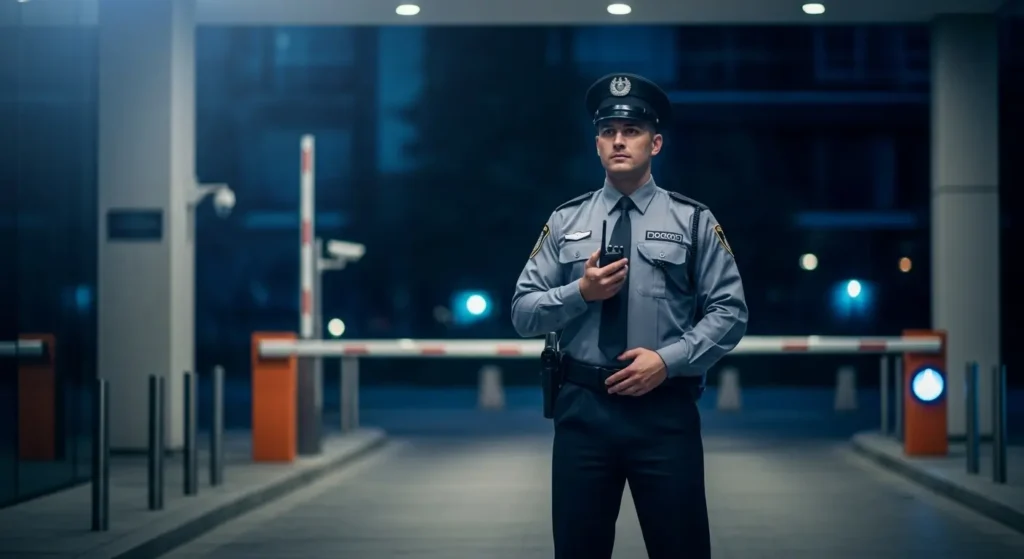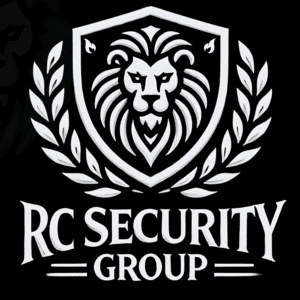Table of Contents


10 Rules Security Guards Should Follow
Introduction
Security guards play a vital role in keeping people, property, and businesses safe. Whether they are stationed at a shopping centre, patrolling a construction site, or managing event security, their actions directly impact safety, reputation, and trust.
At RC Security Group, being a great security guard is not just about wearing a uniform. It’s about following strict professional rules that ensure consistency, reliability, and accountability. In this blog, we’ll share the 10 essential rules every security guard should follow, along with insights on how these rules apply across different services such as mobile patrol, CCTV monitoring, alarm monitoring, and more.
Rule 1: Always Stay Alert and Observant
A security guard’s first responsibility is vigilance. Criminals often look for weak spots, and distractions can create opportunities for theft, vandalism, or trespassing.
- Guards should monitor their surroundings constantly.
- Use both eyes and ears to detect unusual activity.
- Stay focused during shifts, especially at night or in isolated areas.
For instance, in retail security, being alert helps guards spot shoplifting before it escalates.
Rule 2: Communicate Clearly and Professionally
Effective communication is critical to building trust and managing situations. Guards must:
- Speak politely but firmly when giving directions.
- Use radios or communication devices efficiently.
- Report incidents with accuracy and detail.
Strong communication is especially important during emergency and incident response, where clarity can save lives.
Rule 3: Know and Follow the Law
Security guards are not police officers, but they must understand their legal powers and limits. This includes:
- Respecting privacy laws when managing CCTV monitoring.
- Knowing what level of force is legally acceptable.
- Understanding local regulations for crowd control and event security.
Following the law protects both the guard and the client from legal issues.
Rule 4: Maintain Professional Appearance
A guard’s appearance reflects the professionalism of both themselves and the company they represent. Wearing a clean, neat uniform and presenting a confident posture make guards more approachable and authoritative.
At RC Security Group, our personal security guard team is trained to maintain high standards of appearance and conduct to build client confidence.
Rule 5: Be Reliable and Punctual
Arriving late or missing shifts can leave properties vulnerable. Security guards must always:
- Arrive on time.
- Be ready for duty with all required gear.
- Stay focused until the shift ends.
This rule is especially crucial for alarm monitoring and mobile patrol services, where delays could mean missing a critical incident.
Rule 6: Respect Confidentiality
Security guards often handle sensitive information — from visitor logs in access control systems to confidential details in corporate security environments. Guards must never share this information outside their role.
Confidentiality builds trust with clients and ensures compliance with privacy laws.
Rule 7: Respond Quickly to Emergencies
Emergencies can happen anytime. Guards must be ready to:
- Act immediately when alarms sound.
- Evacuate people safely during fire or medical emergencies.
- Call emergency services when required.
With RC Security Group’s emergency and incident response services, guards are trained to act fast, calmly, and effectively.
Rule 8: Use Technology Responsibly
Today’s security services rely heavily on technology like cameras, alarms, and sensors. Guards must:
- Monitor CCTV screens attentively.
- Avoid misuse of access systems.
- Report technical faults immediately.
Technology combined with human vigilance strengthens asset protection, making it harder for criminals to succeed.
Rule 9: Practice Conflict Resolution
Guards often face conflicts — from aggressive customers in retail to disputes at events. Instead of escalating problems, guards should:
- Stay calm and professional.
- Use verbal skills to de-escalate situations.
- Only use force as a last resort and within the law.
This rule ensures safety for everyone while protecting the client’s reputation.
Rule 10: Keep Accurate Records and Reports
A guard’s job doesn’t end with handling incidents — proper documentation is equally important. Daily logs and incident reports help:
- Track suspicious activity.
- Provide evidence for investigations.
- Improve security strategies.
In services like mobile patrol and alarm monitoring, accurate reporting helps clients stay updated and confident in their security.
Why These Rules Matter
Following these 10 rules helps security guards deliver consistent, professional, and effective protection. More importantly, they:
- Build trust with clients.
- Prevent legal complications.
- Enhance safety and reduce risks.
Support teamwork in large operations like event security and corporate security.
Conclusion
The role of a security guard goes far beyond standing watch. It requires discipline, professionalism, and strict adherence to proven rules. By following the 10 rules outlined above, guards ensure safety, maintain trust, and represent their clients and employers with pride.
At RC Security Group, we take these rules seriously — because your safety is our responsibility. Whether you need event security, mobile patrols, or CCTV monitoring, you can count on our team to deliver professional and reliable protection every time.





